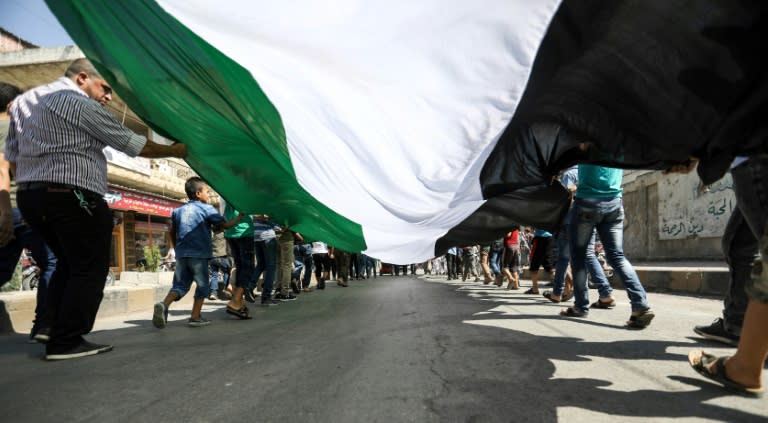Live from Idlib, an American broadcasts from Syria's last rebel zone
Pointing to a green screen as if presenting a weather forecast, Bilal Abdul Kareem analyses the Turkish-Russian deal over Syria's Idlib, broadcasting in his native English from inside the war-torn country's last rebel stronghold. The 47-year-old American convert to Islam is a long way from where he grew up near the Bronx, watching reruns of "Rocky" and eating at Italian restaurants. Dressed in a charcoal suit jacket, the broad-shouldered and bearded Abdul Kareem stares into the camera and insists: "In this deal, this specific deal, nobody can say the rebels were not winners." For the past six years, he has reported from shrinking rebel territory in Syria's north, filming the aftermath of airstrikes, interviewing hardline fighters, even meeting Al-Qaeda members. His contacts, including in the jihadist-led Hayat Tahrir al-Sham (HTS), have granted him extensive access at a time when the risk of abduction makes much of Syria too dangerous for journalists from mainstream news outlets. But it has also prompted allegations that Abdul Kareem is a "jihadist propagandist" and would not have survived in the area had he been an impartial journalist -- particularly given HTS's history of harsh crackdowns against perceived foes. Speaking to AFP from Idlib over Skype, Whatsapp, and Facebook, Abdul Kareem denied the claims and directed accusations of his own: he is suing the US government for allegedly trying to kill him in Syria. As the case drags through US courts, the self-described "bald-headed black guy in the middle of Syria" has remained in Idlib despite fears of a looming regime offensive, continuing to file dispatches for his media upstart, On the Ground News. - CNN to OGN - Born Darrell Lamont Phelps, Abdul Kareem converted to Islam before moving to the Middle East in 2002. He married and had children in Egypt, but declined to disclose their location for security reasons. He arrived in Syria in 2012 from Libya, curious about the rebels battling President Bashar al-Assad's forces in a conflict which at that point was just a year old. Working first with major broadcasters including CNN, he founded OGN in 2015 as editors started to express "doubts" about his political stances, he said. The channel now publishes on YouTube, Twitter, and a Facebook page with more than 86,000 followers. "I have a good working relationship with every group, which doesn't necessarily mean I agree with everything they do or they agree with everything I do," he said. A normal day begins with dawn prayers at 4:30 AM, followed by a routine search of his car for bombs. The rest is up to the news cycle. He could find himself on a motorcycle zipping towards a frontline, lapel mic in hand but without protective gear, or sipping tea with hardcore fighters most Americans would consider unsavoury. "I remember I had these very, very in-depth conversations with different Al-Qaeda members about America, Americans and the democratic system," Abdul Kareem said. He offered unsuccessfully to facilitate a dialogue between Western powers and Idlib's militants, whom he insisted don't have "blood dripping from their fangs and want to eat American children". The US has designated Al-Qaeda and HTS "terrorist organisations". - 'America is not the same' - Around three million people live in Idlib and surrounding rebel territory, including foreigners who have joined the war against the Assad regime. "There are quite a few Americans here. All fighters," Abdul Kareem said. Asked about his future, he recalled escaping second city Aleppo as it fell to the government in 2016. If the same fate awaits Idlib, he said, "I would be one of the last people to leave". Abdul Kareem's 16-year absence from the US has made him miss simple things: speaking English, sugary cereals. But he fears the 2016 election of President Donald Trump has changed the country too much. "It sounds like America is not the same America that I grew up in," he said. His remaining links are with his sister, and a lawsuit he filed last year against Trump and a coterie of US officials, accusing the government of attempting to kill him five times. Once was on a reporting trip. "My car was hit with a drone strike. The car flipped up into the air and landed on its side facing the opposite direction," he said. Abdul Kareem is demanding the government stop targeting him, remove him from any so-called "kill list" and disclose the names of other citizens who may be on it. In the meantime, OGN's cameras keep rolling. "I'm not in America because being here in Syria doing the work that I'm doing and covering the things I'm covering, in my estimation, is the right thing to do," Abdul Kareem said. "People are dying by the droves, and if I can do something to help people see what the real realities are, then what business do I have going back to America right now?"




